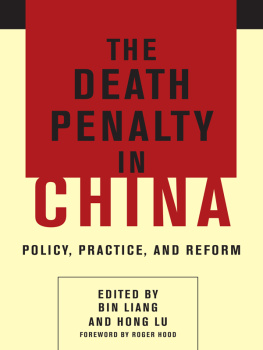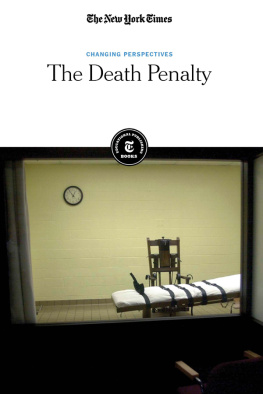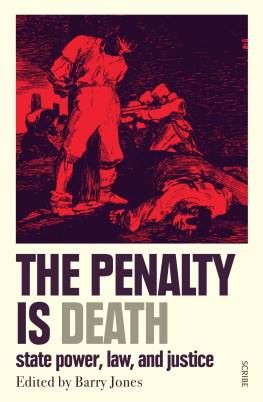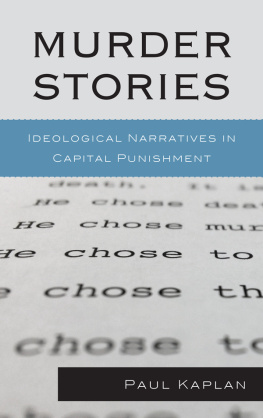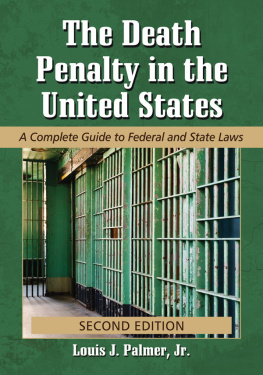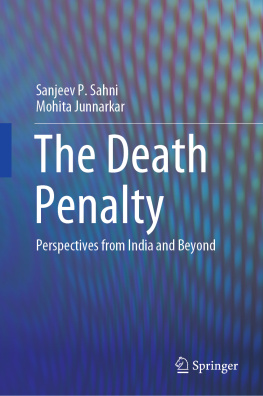University of California Press
Oakland, California
2020 by Sarah Beth Kaufman
Library of Congress Cataloging-in-Publication Data
Names: Kaufman, Sarah Beth, author.
Title: American roulette : the social logic of death penalty sentencing trials / Sarah Beth Kaufman.
Description: Oakland, California : University of California Press, [2020] | Includes bibliographical references and index.
Identifiers: LCCN 2019045949 (print) | LCCN 2019045950 (ebook) | ISBN 9780520344389 (cloth) | ISBN 9780520344396 (paperback) | ISBN 9780520975507 (ebook)
Subjects: lcsh: Capital punishmentUnited States. | Sentences (Criminal procedure)United States. | Criminal justice, Administration ofSocial aspectsUnited States.
Classification: LCC KF 9227. C 2 K 38 2020 (print) | LCC KF 9227.C2 (ebook) | DDC 345.73/0773dc23
LC record available at https://lccn.loc.gov/2019045949
LC ebook record available at https://lccn.loc.gov/2019045950
Manufactured in the United States of America
28 27 26 25 24 23 22 21 20
10 9 8 7 6 5 4 3 2 1
Acknowledgments
Though I didnt know it at the time, this book began during the late 1990s in New Orleans, where Christopher Eades, Shauneen Lambe, Mike Lenore, Billy Sothern, and I learned to negotiate the worlds of criminal justice advocacy and young adulthood simultaneously. I dedicate this book to them and to R. Neal Walker, whose presence was unforgettable, in court and out.
The majority of the book was written more than a decade later, when Charley Price gave me the gifts of joy and time, for which I am eternally grateful. Our remarkable children Raymond Everett Kaufman Price and Aviva Faith Kaufman Price are evidence of the best of us both.
The path between these two time periods was not at all straight, and could have taken a turn at several junctions. That I became a scholar is a testament to friends, family, and teachers. I was first a graduate student at Tulane University where Joel Devine, Beth Fussell, Melinda Milligan, and especially Scott Frickel exemplified sociologys potential. Scott introduced me to something called the sociology of knowledge, which I did not realize I had been looking for. I was then mentored by an extraordinary group of scholars at New York University. Primary among these was David Garland. That his scholarship shaped this book is evident. Less evident is his influence as a human being. Whether I was at my worst or at my best, David was as incisive and kind a mentor as any Ive ever met. He is a model to me. Craig Calhoun and Richard Sennett were also formative advisors. They introduced me to cultural sociology and the NYLON network that provided my much-loved institutional home. Craigs generosity is as astonishing as his mind, offering without hesitation his home, family, and dogs, as if his detailed and always brilliant feedback wasnt enough. Richards insistence on the human, creative aspects of sociology inspires me to this day. NYLON gave me the opportunity to appreciate the smarts and friendship ofamong othersWill Davies, Saran Ghatak, Jane Jones, Monika Krause, Amy Leclair, Tey Meadow, Ashley Mears, Owen Whooley, and Grace Yukich, all of whom read and commented on earlier drafts of this work. I love you all. Lynne Haney, Rayna Rapp, Eric Klinenberg, and David Greenberg were teachers and advisors extraordinaire.
I conducted research for the book while traveling around the country. In this, I benefited not only from a National Science Foundation Doctoral Dissertation Research Improvement Grant in the Law and Social Sciences (#0719721), but also from the homes, conversations, and other essentials provided by Richard Bourke and Christine Lehman, Ellen and George Galland, Hillary Galland, Scharlette Holdman, Jane Jones, Phil, Ronnie, and Aron Kaufman, Monika Krause, Maya Kremen and Jeff Davies, Denny LeBoeuf, Amy Leclair, Ashley Mears, Katya Semyonova, Rebecca Snedeker, Billy Sothern and Nikki Page, and Kim Watts. I also spent a year as a visiting scholar in the Department of Sociology at the University of Texas at Austin. There Javier Auyero, Ben Carrigan, Danielle Dirks, Sheldon Eckland-Olsen, Jim Marcus, Mary Rose, and Meredith Rountree were wise guides. Mary LaMotte Silverstein also provided editorial advice and, with Jake Silverstein, great intellectual and emotional companionship.
I cannot say enough how fortunate I am to then have landed at Trinity University in the Department of Sociology and Anthropology. My colleagues Christine Drennon, Jennifer Matthews, Meredith McGuire, Alfred Montoya, Tahir Naqvi, Richard Reed, Ben Sosnaud, David Spener, and Amy Stone are the absolute best of academia. Bill Christ, Stacey Connelly, Irma DeLeon, Kathleen Denny, Habiba Noor, Elizabeth Rahilly, Kate Schubert, Sussan Siavoshi, and Claudia Stokes have also supported me intellectually, organizationally, and emotionally. My weekly writing groupPatrick Gallagher, Anne Hardgrove, and Tahir Naqvikept me on task and laughing despite the neoliberal charter school advocates encroachment. At Trinity, an excellent cadre of undergraduate researchers worked on this project with me. To Faith Deckard, Erin Drake, Frances Kennedy-Long, Madison Matthies, Jacob Metz-Lerman, and Lily Sorrentino: thank you! I am also indebted to Trinity Universitys president, Danny Anderson, and the vice president for academic affairs, Deneese Jones, who enabled this project by trusting me (and funding me!) to stray from it. It was only by collaborating with Habiba and Bill on our play, To Be Honest, that this book took its shape. While on pretenure leave granted by Trinity, I also benefited from the care of Emily Bolton and Clive Stafford-Smith (even in absentia), Megan Colletta and Bill Short, and Shauneen Lambe in Dorset and London.
To turn the manuscript into a book, I could not imagine a better team than mine at the University of California Press, including Madison Wetzell, Cindy Fulton, and Jeff Wyneken. Patrick Anderson and Maura Rossener in particular improved this book in ways that I did not anticipate. I waited to finish it until you were ready to help me, I think! Thank you for going above and beyond. I also thank Garth Bryant, Craig Calhoun, Ron Levi, and Mary Rose for feedback on chapter 3.
Finally, in a category of their own are my parents, Phil and Ronnie Kaufman. Among the thousands of ways they helped during this projects formulation, my mother rescued me from an employment disaster and cared for my children. My father read chapter drafts and never hid his pride. For them I am so very lucky. And to Steve Kaufman: I would never have gotten to this place without your tremendous support.
My mistakes, of course, remain all my own.
Two chapters were published in earlier versions as journal articles: chapter 4 appeared as Citizenship and Punishment: Situating Death Penalty Jury Sentencing, Punishment and Society: The International Journal of Penology 13, no. 3 (2011): 33353; and chapter 7 as Mourners in the Court: Victims in Death Penalty Trials, through the Lens of Performance, Law and Social Inquiry: Journal of the American Bar Foundation 42, no. 4 (2017): 115578.


